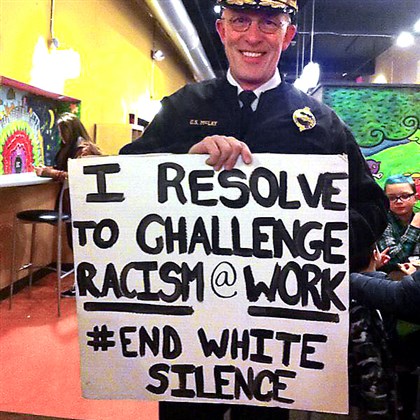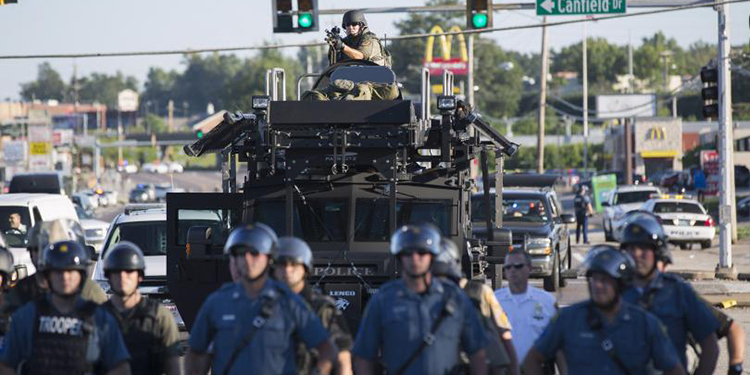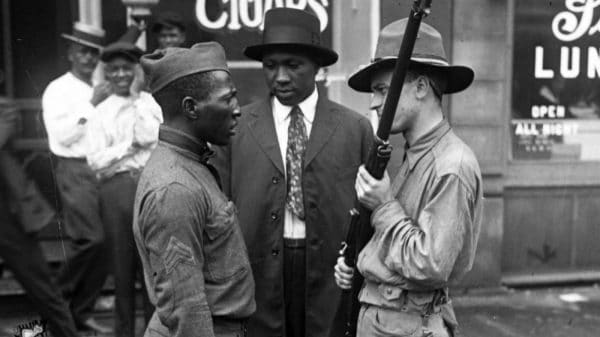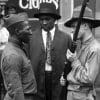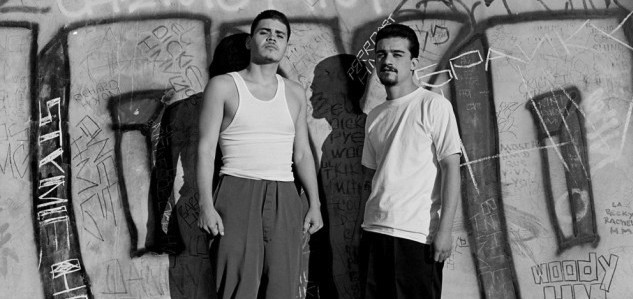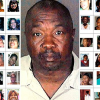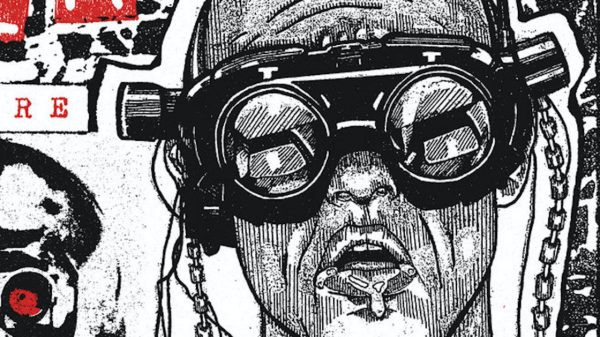The right of the people to be secure in their persons, houses, papers, and effects, against unreasonable searches and seizures, shall not be violated, and no Warrants shall issue, but upon probable cause, supported by Oath or affirmation, and particularly describing the place to be searched, and the persons or things to be seized. – 4th Amendment to the Constitution of United States of America
All persons born or naturalized in the United States and subject to the jurisdiction thereof, are citizens of the United States and of the State wherein they reside. No State shall make or enforce any law which shall abridge the privileges or immunities of citizens of the United States; nor shall any State deprive any person of life, liberty, or property, without due process of law; nor deny to any person within its jurisdiction the equal protection of the laws. – 14th Amendment to the Constitution of United States of America
If you are standing still you may be subject to arrest. – Police officer to protestors in Ferguson, Missouri, following the killing of Michael Brown by Officer Darren Wilson
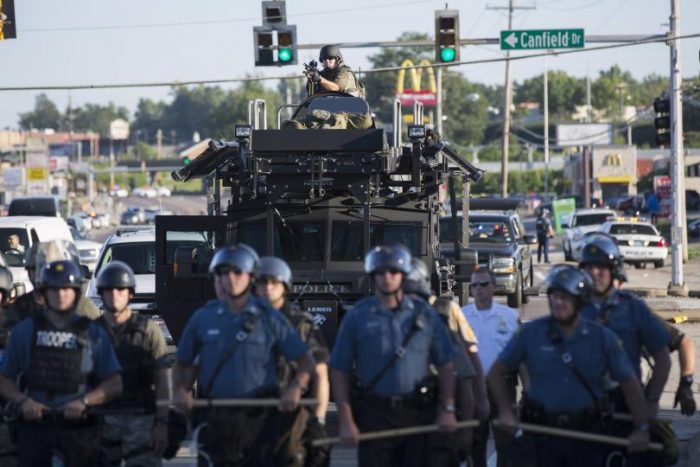

In the first part of this examination of the systemic racism inherent in the American criminal justice system, we looked at federal and state legislative actions that have had a disproportionate effect on African Americans in this country. As a result of these actions, more black than white men are incarcerated in state prisons, and often for longer sentences, despite the fact that African Americans, both male and female, make up only thirteen percent of the total American population. This means that blacks are 5.1 times more likely to be incarcerated than whites. But while the laws are stacked against blacks in America, no one can be prosecuted and sentenced without first being arrested, and for that you need police. This article will focus on policing, and what the Department of Justice now deems to be systemic racism in many of our nation’s police departments.
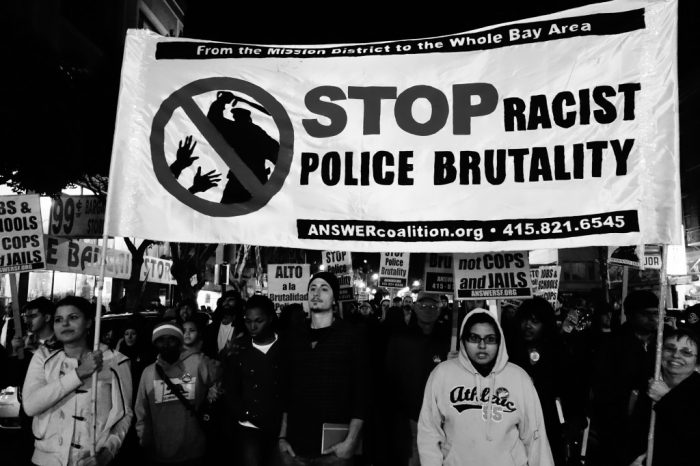

When I was a young lawyer starting out, I was assigned to Drug Court, which is exactly what it sounds like – a court that deals with only drug cases. What I noticed very quickly was that the absurdly overwhelming majority of my clients were young black men. It was as if white people simply didn’t do drugs…ever. Of course, as a white male who is a fan of doom metal, I knew that wasn’t at all true. So what was going on? Why were all of my clients black, with nary a single hesher in a Sleep t-shirt to be found? The answer turned out to be a relatively simple, albeit ugly explanation: police departments operate in the most racist way possible, targeting and singling out black men to stop and harass. Occasionally during those stops, they find weed in someone’s pocket or under someone’s car seat. They are not stopping and harassing white men. If they were, maybe my clientele would have more accurately reflected the actual national statistics regarding drug usage and dealing that finds whites engage in drug activity a whopping 45 percent more than their black counterparts. Of course, you would never in a million years guess that going into our cities’ drug courts and looking out on the sea of anonymous black faces that populate the galleries. The police are able to pull off this sleight of hand in two ways; the first is through the over-policing of our nation’s cities and streets, while the other is the exploitation of minor traffic offenses which provide a run around for the protections provided by the Fourth Amendment.
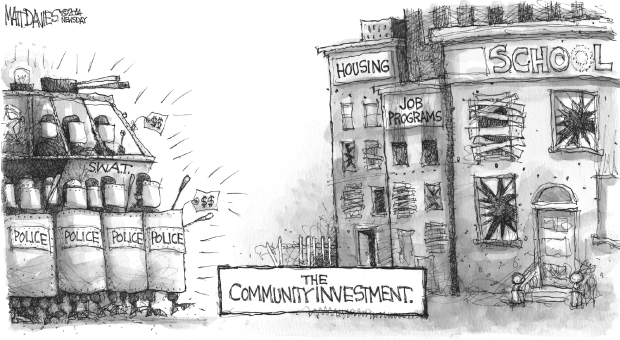

First, let us look at over-policing. Since that wonderful 1994 Clinton Crime Bill we examined in part one of this series, the trend has been to add more officers to the nation’s police departments and increase patrols. Since 1992 to 2008 (the last time any mass statistical survey was undertaken), we have added roughly 350,000 to 400,000 officers to our nation’s police forces, with nearly all of those going to cities, as most rural communities have either maintained a consistent number or have actually lost officers. Those increased numbers of officers then flooded our city’s streets to undertake what is referred to as “broken window policing.” “Broken window policing” is based on the belief that if you confront small crimes such as trespassing or vandalism, it will have a bottom-up effect on larger crimes, thus reducing the overall crime rate. The theory goes that if police signal that they will not tolerate “disorder” and blight in urban communities, it will set up norms of order and lawfulness, preventing major crimes from taking root. If you focus on stopping graffiti on the side of an abandoned building, then you prevent the breaking of windows in that abandoned building, which then prevents someone from eventually breaking into the abandoned building – or so the argument goes. It’s based on an environmental theory of order versus chaos that promotes the imposition of order to annihilate chaos, but in this case the chaos is a group of black kids hanging out on a street corner, and the order is stopping and frisking them with the goal of either arresting them for a minor misdemeanor or harassing them and sending them on their way, either way resulting in increased tensions between black communities and the police.
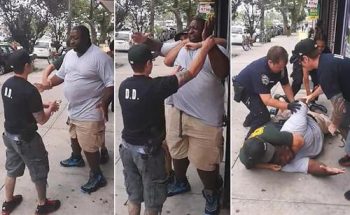

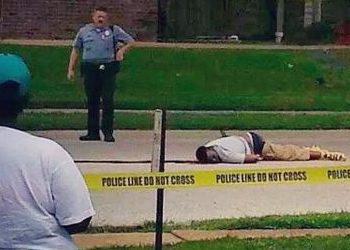

That all sounds incredibly clinical when I write it, but put yourself in the shoes of that young black kid who is just hanging out with his friends. Police roll up and come at you looking for a reason to arrest you. Often the cops intimidate and bully, even call you racial slurs, just waiting for a sign of non-compliance, just waiting for you to offer up a verbal quip or any other form of “disrespect,” whether it be a gesture or even an eye-roll. Then the cop escalates the situation and grabs you by the arm or throat, and you instinctively react as anyone would when another person uninvitedly breaks the threshold of physical space between yourself and the other – and you flinch. That’s resisting. Stop resisting. Why are you resisting? Then comes the force – it may be an armbar, it may be a necklock, it may be a taser, it may be a fist – and if you are lucky you are just getting cuffed and going to jail. If you aren’t, you end up bleeding out on the street and maybe being filmed by some bystander’s camera phone to wind up on the nation’s cable airwaves as a new point of outrage in the never-ending cycle of black men dying for no goddamn good reason other than the fact they are black men. Your name gets added to the ever-growing list of unarmed fatalities at the hands of police, and white people on Facebook say that if only you had complied with the officer’s orders and not rolled your eyes you would be alive, and that anytime they have had an interaction with a police officer, they have never had a problem. It never dawns on them that no police officer has ever even stopped and frisked them for hanging out with their friends, because why would they, and no police officer has ever narrowed their reactive choices down to a box that they could never get out of without drawing the whole weight and force of State power down upon their heads. And lost in all of this, always, is that these harassments, these arrests, these murders of young black men almost always stem from non-compliance to the desired “order” of the police, the same order imposed to root out “broken windows.” Resisting that order, white America now believes, deserves the death penalty. We shall have no broken windows, and black men are the ultimate undesirable “broken window” in the urban landscape.
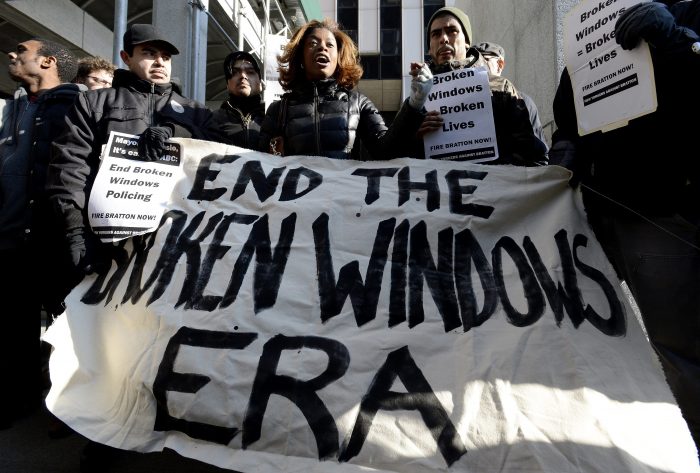

Now the solution, according to policy makers, is “community policing,” which is some fantastical world where police forces build close relationships in neighborhoods with community leaders (or snitches) to help them police. But this new and improved model is pretty much the same thing (except with more meet and greets at the community center) with the same problem, which is police policing. A police officer is trained to look for threats, to look for suspicious activity, and if you flood a neighborhood with cops, then the likelihood of interactions that end in a negative result as detailed above is going to increase. What wasn’t a crime before now is, because of escalation of threat and force through police interaction. You are never under any duty to talk to a cop – but try not talking to a cop when he is in your face. Simply exercising your constitutional rights suddenly makes you suspect and quite quickly a criminal once that escalation begins. Policing, as a concept and practice, is basically cops looking for crime, which they often actually cause as a result of increased police interaction that escalates into an infraction or misdemeanor. So rather than reducing crime, policing can actually have the exact opposite effect. This happens more in black neighborhoods than white simply because of racism within police departments, and there is no delicate way to put that, other than to be honest and call it for what it is. This isn’t a “few bad apples,” this is systemic, as has been proven in DOJ investigations of police departments recently. Not that I ever needed to read a DOJ report to confirm what I already know from working in the system. The fact is that whites walking down the street are not being profiled and stopped for walking down the street, even in poor neighborhoods, while blacks are. This is why drug courts are full of black kids who get caught with a roach on them, and why white kids in the suburbs with the ounce of purple kush get to go to college without ever having a criminal record to overcome.


The next, less obvious, way that police are able to disproportionately target African Americans is through traffic laws that are set up to punish the poorest among us in ways that the rest of us are completely unaware of. When you get a traffic ticket, you are charged with a fine, usually something in the $150 range. For most of us, this is an annoyance, but nothing we can’t handle. Of course we will deal with it, because if we don’t our driver’s license will be automatically suspended, and usually the state will slap us with another fine. At that point, in order to get our license back we not only have to pay the original $150, but whatever extra fine has been added on, which usually is somewhere between $100 to $150. So now you have to pay $300 to take care of that traffic ticket and be legally licensed to drive once again. But what if you can’t afford that $300, or even the $150 ticket? What if you are trying to pay it off, but you need to drive to work in order to make the money needed to do that, so you take the risk and drive with your license suspended? Hopefully nothing will happen, but if you happen to get stopped on the way to work, it may be the beginning of a long descent into criminality. An unlicensed driver can be charged with the criminal offense of driving while suspended, which now not only carries with it a much larger fine than the initial traffic ticket, but also the possibility of jail time. From that first arrest for a driving offense, it is not unusual to see a spiral that continues until the driver is facing felony charges as a Habitual Traffic Violator, simply because the individual cannot pay their fines, but continues to drive. While you may think that someone who isn’t licensed to drive shouldn’t be driving, consider that often drivers need to drive to get to work to survive, but have also amassed so many fees that they cannot get ahead to pay them off and regain their license. Also consider that you can end up going to prison for simply driving a motor vehicle without a proper driver’s license because each time an unlicensed driver is charged, the penalties are progressively enhanced, so what started as an infraction ends up as a felony after only a couple of stops. Imagine the following prison conversation:
“What are you in her for?”
“Oh, I robbed a gas station.”
“What about you?”
“I killed a dude that needed killing.”
“What about you?”
“I drove my car to work.”
“What? Was you drunk?”
“Nope”
“You hit and run someone?”
“Nope”
“You mean to tell me you in here because you just because you drove?”
“Yep.”
Welcome to America.


But even if it never gets to that level, the loss of a license gives the police another way around the Constitution. Motor vehicles, like homes, are constitutionally protected from illegal searches under the Fourth Amendment without a warrant, but one common warrant exception applies when police have to exercise control over a car in order to ensure community safety. What this means in simple terms is that after a traffic stop, if there is no one to drive a car because the driver was unlicensed, and that car is just sitting in the street and not legally parked, the police can then have it towed. The problem is that for liability purposes, they can also perform an “inventory search” under the guise that they are cataloging the contents of a person’s vehicle for safekeeping. Of course, the realistic effect of these inventory searches is to sidestep the warrant requirement for searches in order to uncover further criminal activity, often times drugs or guns that may be present in the car. If found, then the driver is no longer just facing a driving charge, but is now facing a drug or gun charge.
What does any of this have to do with racism? Let me tell you a story about a white, devil-worshiping metal-loving criminal defense attorney who, as a social experiment, and because he was too lazy to go online and update his plates, drove around a major metropolitan area for nearly a year with an expired license plate. This attorney loves to drive fast, especially when he is playing Slayer, which he often does in the morning to get the blood pumping. On his way into work, there is a cop that sits and waits, and, to be fair, rather indiscriminately hands out tickets to speeders. One day, the attorney was driving at least 20 miles over the limit because “Angel of Death” was on the stereo, and the cop lit him up. The cop got out, took the attorney’s license and registration, and went to his car. While the cop was running his information, the attorney began to freak out, worrying that he would have to call his girlfriend to come pick him up because he was sure the cop was going to ding him for driving with expired plates (by nearly five months at this point) and do to him what police have done to his black clients – which is tow his car and do an inventory search. The cop got out of his cruiser, approached the attorney’s driver side window, handed him a speeding ticket, told him the instructions were on the back and sent him on his way. Nary a mention of the plates, not even a citation for them. Since that time, the attorney has driven with a cracked windshield (a traffic violation that gets plenty of his black clients stopped), headlights out (more bait for a traffic stop) and expired plates forever while not using a turn signal or wearing a seatbelt (all of which will guarantee a stop for a black person), and not a single police officer has so much as even noticed him, even as they have driven right beside or behind him. Of course that attorney is me, and I’m not the only one with this story, many of my white colleagues have had similar experiences, or rather non-experiences, with the police. But if you were to go into a drug court and survey the black defendants there you would think that traffic interdiction for minor infractions was the most serious job the police have. The simple fact is that driving while black in America is a crime, and if you don’t know or believe that, it means you are white.


As if the empirical data that proves a massive disparity between whites who are charged with crimes and blacks who are charged with crimes isn’t enough to demonstrate the racism inherent in our nation’s police forces, recent high profile investigations of major metropolitan police departments have been horrifyingly eye-opening. Last year the DOJ found that the Baltimore Police Department is plagued with institutional systemic racism, and just last week the DOJ released a damning report of the Chicago Police Department that included this pertinent section:
Recurrence of unaddressed racial discriminatory conduct by officers further erodes community trust and police effectiveness. Our investigation found that this pattern or practice of misconduct and systemic deficiencies has indeed resulted in routinely abusive behavior within CPD, especially toward black and Latino residence in Chicago’s most challenged neighborhoods. Black youth told us that they are routinely called “nigger,” “animal,” or “pieces of shit” by CPD officers. A 19-year-old black male reported that CPD officers called him a “monkey.” SUCH STATEMENTS WERE CONFIRMED BY CPD OFFICERS (emphasis mine). One officer interviewed told us that he personally heard co-workers and supervisors refer to black individuals as monkeys, animals, savages, and “pieces of shit.”


So, put all of those “few bad apple” arguments into the garbage heap where they belong – it simply isn’t true that only a few rogue cops are to blame for this problem. From my own personal experience, I’ve heard cops openly refer to one black neighborhood they patrol as the “swamp,” which seems quaint by Chicago standards, and at least one officer refer to it as Fallujah. I’ve also heard officers describe an “us against them” mentality, which is bad enough on its own, but combined with a racist worldview, becomes deadly for black Americans. This mentality is drilled into them during their training and supported among their ranks. Dave Grossman, who is the county’s top law enforcement trainer, and the closest thing the police have to a self-help guru, goes around the nation telling our cops the following pile of crap:
“If you have no capacity for violence then you are a healthy productive citizen: a sheep. If you have a capacity for violence and no empathy for your fellow citizens, then you have defined an aggressive sociopath – a wolf. But what if you have a capacity for violence, and a deep love for your fellow citizens? Then you are a sheepdog, a warrior, someone who is walking the hero’s path… We know that the sheep live in denial; that is what makes them sheep. They do not want to believe that there is evil in the world… The sheep generally do not like the sheepdog. He looks a lot like the wolf. He has fangs and the capacity for violence. The difference, though, is that the sheepdog must not, cannot and will not ever harm the sheep.”
– Grossman from his essay “On Sheeps, Wolves and Sheepdogs”
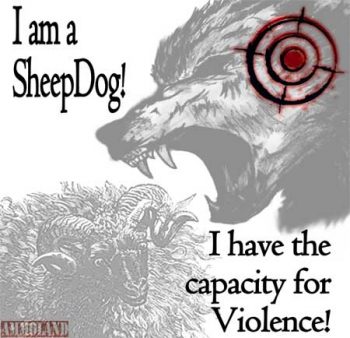

Grossman, who fetishizes this “us vs. them” mentality, as well as what he deems to be “righteous violence” in the fight against “evil,” is required reading at the FBI academy and is revered as some sort of prophet among cops. His dim worldview carries over into the street so that when police encounter a civilian they are either “sheep” or “wolves,” but certainly a “them” in the us vs. them divide. Part of me sympathizes with this worldview. As a criminal defense attorney, I do not feel like a “civilian.” I’ve seen too much and been too close to the violence for so long that I cannot deny the darkness of the world Grossman is talking about; the problem is that the “evil,” in large part, stems directly from that us versus them approach in which he is so invested. When I see you as nothing but “the other” – the sheep, the wolf, the whatever – then ultimately you are nothing but meat to me to be cut down. That’s where the darkness lays, this dehumanization of “the other.” Carried to its ultimate conclusion that same us versus them mentality that Grossman promotes, and that cops buy into, is what allows me to see a cop as fair game in this war, and vice versa. It cuts both ways and ultimately we determine who is actually welding the “righteous violence” by whoever emerges on top and gets to write the rules. Point being, by Grossman’s own worldview, there is nothing that stops me from putting him down in an act of “righteous violence” in the war against racism, and in which a whole new group of people get to be the sheepdogs against the wolves with badges (although I would much rather be called a wolf than a sheepdog any day). This duality, this division that Grossman preaches and cops lap up, is exactly the root of the problem between police and the public. We don’t trust each other and we don’t see each other as equals, or at least deserving of equal rights, and in the worst cases we don’t even see each other as human beings worthy of existence. Add to that the increased militarization of our police forces (a terrifying subject on its own) and it is no wonder that cops stalk American city streets in black neighborhoods that they refer to as Fallujah, the most infamous city in the Iraqi War that was the scene of mass fatalities and war crimes, and where black American citizens can be deemed enemy combatants for simply walking down the street.


So, what are the solutions? First, admit there is a problem. Police still have a long way toward any semblance of self-awareness, particularly white cops. A recent Pew Survey found that 67% of police think fatal encounters with African Americans are isolated events instead of symptoms of a greater problem, while 60% of the public think otherwise. Furthermore, 68% of police also think protests against them are not motivated by a genuine desire to hold them accountable, but are instead the result of a long standing bias against them (again feeding into that us vs. them mentality). The most telling numbers in the survey are officers’ opinions concerning relations between police and different races. 60% of white officers believe they have excellent or good relationships with blacks, but only 32% of black officers believe this. Similarly, 75% of white officers believe they have excellent or good relations with Hispanics, whereas only 46% of black officers do. Just as in the general population, white officers seem to be wholly unaware of their own prejudices or how those prejudices effect other races they come into contact with, whereas the black officers, by virtue of being black, know exactly where police stand with black America.
Tragically, given the attitudes of the incoming Trump administration, I have little hope that things will improve at all; instead, I anticipate an increase in the flashpoints of violence that we have seen across the nation already over the past few years, and I expect bodies will continue to pile up on both sides. If police truly want to feel safe on the streets, then they need to stop listening to preachers of hate and division like Dave Grossman and start treating the residents of the streets they patrol like human beings instead of animals. When you beat on an animal long enough, you shouldn’t be surprised when it finally bites back. Until police learn this lesson, I expect to see more black bars across stars and more black men dying for no goddamn good reason at all.
